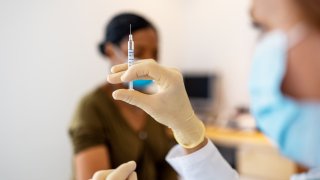
On Saturday, Johnson & Johnson's Covid vaccine gained emergency use authorization by the Food and Drug Administration, making it the third coronavirus vaccine available in the United States.
In the U.S., the shot has shown 72% effectiveness at preventing Covid and 86% effectiveness at preventing severe illness and death from Covid, according to data submitted to the FDA. For perspective, Moderna and Pfizer-BioNTech's Covid vaccines, which both utilize messenger RNA and require two doses given a month apart, are 95% effective at protecting against Covid.
Although Johnson & Johnson's protection is lower, "it's not the weaker vaccine," Dr. Anthony Fauci, White House Chief Medical Advisor, told NBC's "Meet the Press" Sunday. "They are all three really good vaccines."
Experts have said that you should take whatever vaccine is available to you once eligible. (To check your eligibility status, you can use NBC News' plan your vaccine tool.)
"If you go to a place and you have J&J, and that's the one that's available now, I would take it," Fauci told "Meet the Press." Here's why:
It brings us closer to herd immunity
Get Tri-state area news delivered to your inbox. Sign up for NBC New York's News Headlines newsletter.
Having a third Covid vaccine option "substantially reduces the time it takes the U.S. to reach herd immunity," Lisa Lee, an infectious disease epidemiologist and a public health ethicist at Virginia Tech, said in a statement. Herd immunity is achieved when a significant portion of a population becomes immune to an infectious disease, lowering the risk of infection.
Money Report
Currently, the U.S. is "nowhere near herd immunity," Adam MacNeil, an epidemiologist at the Centers for Disease Control and Prevention, said Friday.
Johnson & Johnson expects to deliver 20 million doses of the single-dose vaccine by the end of March, and 100 million by the end of June. Americans could have the vaccines in their arms within the next 24 to 48 hours, CEO Alex Gorsky told NBC News' TODAY on Monday.
It only requires one dose
Johnson & Johnson's vaccine is different from Moderna and Pfizer's because it uses adenoviruses, a type of virus that causes the common cold, as a vehicle to deliver instructions to cells about how to fight the virus.
The vaccine is delivered in one shot, and does not require the same sub-zero refrigeration and storage as the mRNA vaccines, which could be a game-changer in quickly distributing the vaccine, especially to remote areas.
It prevents severe illness and death
"When you think of what do you want from a vaccine, you don't want to go to the hospital, and you certainly don't want to die," Gorsky told CNBC's "Squawk Box" Monday. "And what we have seen as far as 100% efficacy in those parameters, again with a single shot."
When it comes to preventing severe illness in addition to hospitalization and death, the Johnson & Johnson vaccine was shown to be 86% effective. The vaccine also showed 82% efficacy against severe disease from the more contagious South African strain.
Gorsky called the Johnson & Johnson vaccine "an incredibly important tool" in helping healthcare systems keep people out of hospitals and prevent death from Covid.
Stopping the spread also stops mutations
When more of the population is vaccinated, it decreases the likelihood of further mutations developing, which is another reason why people should get vaccinated as soon as possible.
"When we stop transmitting between people, we also stop the opportunity for mutation," Lee previously told CNBC Make It.
With regards to the variants, the FDA says that clinical trials showed that Johnson & Johnson's vaccine provided "protection against several emerging SARS-CoV-2 variants of concern," including the ones from South Africa and Brazil.
For instance, the data that Johnson & Johnson submitted to the FDA on Feb. 4 showed that in South Africa, where the more contagious B.1.351 strain is dominant, the vaccine was 57% effective at preventing infection (and it was 64% effective in preventing moderate to severe or critical Covid a month later, according to FDA data).
Gorsky said that the company is "designing software [in] real time to help address of some of these new and emerging variants," he told CNBC's "Squawk Box" on Monday. "We're quite confident based upon the clinical data that we already have with our vaccine that we're going to see a very robust response," he said.
Check out: The best credit cards for building credit of 2021
Don't miss: Experts say Covid could become endemic — here’s what that means for you






